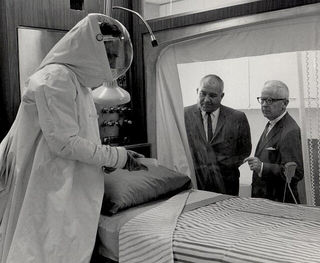Coronavirus Disease 2019
Lessons From 'Life Island'
How an experiment by the "Cancer Cowboys" a half-century ago can help us today.
Posted March 19, 2020

A half-century ago, doctors at Roswell Park in Buffalo, New York, opened germ-free units called “Life Islands.” Developed by an elite group of medical experts, the “Cancer Cowboys,” these germ-free units appeared to be a major step forward. But they soon encountered some of the problems we’re now facing with the COVID-19 pandemic.
The Life Islands were intended for patients whose immune systems had been weakened by rounds of chemotherapy. Over a three-year period, 52 patients stayed for weeks and even months in the germ-free units. They ranged in age from 17 to 73 years of age. All the patients’ beds were in view of the nurses’ station and any objects coming into the room needed to be sterilized. Food was passed into the units through a special door.
Patients were urged to keep a diary, either written entries or tape recordings, about their mental state. Nurses filled out questionnaires about the patients at the end of their shifts. A 50-item checklist tracked behavior, anxiety, and discomfort on a five-point scale.
Soon Dr. Jimmie Holland saw a disturbing trend: As early as the third day inside the isolator, close to one-half the patients said they missed direct interaction with other people.
“The lack of direct touch and contact with people you love has created disturbances,” one patient wrote in his diary.
Another reported, “You just feel you are all alone in the world and everything is cold and there is no warmth.”
Even though the science appeared solid on paper, cancer remissions didn’t improve. In fact, they soon fell, and the program was eventually disbanded. So, with the world increasingly hunkering down, becoming more of a solitary place, what can we learn from Life Islands?
A good friend of mine died last month and at his memorial service, his best friend from high school spoke. This friend talked about how the two had fallen out of touch and how much he regretted that now. “Pick up the phone,” he told us. “If you’ve lost track of someone who was once important to you, call them, reach out. Don’t let happen to you what’s happened to me.”
We spend so much time checking Facebook, Twitter, and alike these days. As if we’re searching for a message in a social media bottle. Yet the key may be to turn off the news updates and search for something more humane.
For example, Bob Fonseca at KLBJ-FM in Austin is riffing and talking to fans on his afternoon drive into the radio station via Facebook Live. Among his nuggets of advice, “Listen to the Beatles. They’re good for your soul in such times.”
Musician Mike Clem gained a following by doing house concerts throughout the mid-Atlantic. Due to the virus outbreak, he’s now playing on Facebook Live, with a virtual tip jar.
More gyms and fitness centers are offering video workout packages to their patrons. And in the town where my wife and I live, many restaurants remain open with takeout options. We picked up pizza last night and even talking to one of the owners from across the street, ensuring we had the right order, felt so good.
Who knows how long the storm outside will rage. Still, if the experiment of the Life Islands has taught us anything, it is that we cannot isolate ourselves entirely from the rest of the world. Our very essence requires something more.
With that in mind, reach out to someone you haven’t talked to in a while, troll the internet for something other than news, and remember we’re still a part of a larger community. We may have to keep our distance for a while longer, but we still all belong.


